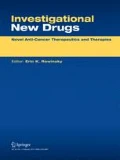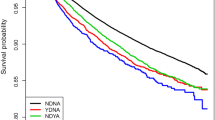Summary
Introduction The PI3K/Akt/mTOR pathway plays a critical role in cancer cell growth, proliferation and angiogenesis, but also in brain homeostasis and the pathophysiology of mood disorders. The impact of the mTOR inhibitor everolimus on the mood of breast cancer patients is unknown. Materials and methods Consecutive, post-menopausal metastatic breast cancer patients receiving hormone therapy +/− everolimus were prospectively followed-up using the Beck Depression Inventory (BDI) and the MADRS (Montgomery and Asberg Depression Rating Scale) questionnaires. Results Post hoc tests comparing everolimus + hormonotherapy to hormonotherapy alone demonstrated a significant effect of everolimus after 6 weeks of treatment on BDI scores (t(1,38) = −2.0716, p < 0.05), and after 3 weeks (t(1,38) = −3.9165, p < 0.001) and 6 weeks of treatment (t(1,38) = −2.0373, p < 0.05) on MADRS scores. Analysis within each treatment group showed that the effect of time since treatment initiation on BDI and MADRS scores was specifically observed in the everolimus + hormonotherapy group (F(2,34) = 11.875, p < 0.001 and F(2,34) = 7.820, p < 0.01 respectively), but not in the hormonotherapy alone group (F(2,34) = 1.671, p > 0.2 and F(2,34) = 0.830, p > 0.2 respectively). Conclusions The mTOR inhibitor everolimus induces significant mood alterations in breast cancer patients. The evaluation of psychiatric symptoms is not only mandatory in the context of phase 1, dose-finding studies of PI3K/Akt/mTOR inhibitors, but is also clinically relevant in daily practice.


Similar content being viewed by others
References
Chiarini F, Evangelisti C, McCubrey JA, Martelli AM (2015) Current treatment strategies for inhibiting mTOR in cancer. Trends Pharmacol Sci 36:124–135
Hoeffer CA, Klann E (2010) mTOR signaling: at the crossroads of plasticity, memory and disease. Trends Neurosci 33:67–75
Abelaira HM, Réus GZ, Neotti MV, Quevedo J (2014) The role of mTOR in depression and antidepressant responses. Life Sci 101:10–14
Hadamitzky M, Herring A, Keyvani K, Doenlen R, Krügel U, Bösche K, Orlowski K, Engler H, Schedlowski M (2014) Acute systemic rapamycin induces neurobehavioral alterations in rats. Behav Brain Res 273:16–22
Ota KT, Liu RJ, Voleti B, Maldonado-Aviles JG, Duric V, Iwata M, Dutheil S, Duman C, Boikess S, Lewis DA, Stockmeier CA, DiLeone RJ, Rex C, Aghajanian GK (2014) Duman RS. REDD1 is essential for stress-induced synaptic loss and depressive behavior. Nat Med 20:531–535
Jernigan CS, Goswami DB, Austin MC, Iyo AH, Chandran A, Stockmeier CA, Karolewicz B (2011) The mTOR signaling pathway in the prefrontal cortex is compromised in major depressive disorder. Prog Neuro-Psychopharmacol Biol Psychiatry 35:1774–1779
Li N, Lee B, Liu RJ, Banasr M, Dwyer JM, Iwata M, Li XY, Aghajanian G, Duman RS (2010) mTOR-dependent synapse formation underlies the rapid antidepressant effects of NMDA antagonists. Science 329:959–964
Denk MC, Rewerts C, Holsboer F, Erhardt-Lehmann A, Turck CW (2011) Monitoring ketamine treatment response in a depressed patient via peripheral mammalian target of rapamycin activation. Am J Psychiatry 168:751–752
Yang C, Zhou ZQ, Gao ZQ, Shi JY, Yang JJ (2013) Acute increases in plasma mammalian target of rapamycin, glycogen synthase kinase-3β, and eukaryotic elongation factor 2 phosphorylation after ketamine treatment in three depressed patients. Biol Psychiatry 73:e35–e36
Lin CJ, Robert F, Sukarieh R, Michnick S, Pelletier J (2010) The antidepressant sertraline inhibits translation initiation by curtailing mammalian target of rapamycin signaling. Cancer Res 70:3199–3208
Halloran J, Hussong SA, Burbank R, Podlutskaya N, Fischer KE, Sloane LB, Austad SN, Strong R, Richardson A, Hart MJ, Galvan V (2012) Chronic inhibition of mammalian target of rapamycin by rapamycin modulates cognitive and non-cognitive components of behavior throughout lifespan in mice. Neuroscience 223:102–113
Lang UE, Heger J, Willbring M, Domula M, Matschke K, Tugtekin SM (2009) Immunosuppression using the mammalian target of rapamycin (mTOR) inhibitor everolimus: pilot study shows significant cognitive and affective improvement. Transplant Proc 41:4285–4288
Raymond E, Alexandre J, Faivre S, Vera K, Materman E, Boni J, Leister C, Korth-Bradley J, Hanauske A, Armand JP (2004) Safety and pharmacokinetics of escalated doses of weekly intravenous infusion of CCI-779, a novel mTOR inhibitor, in patients with cancer. J Clin Oncol 22:2336–2347
Chan S, Scheulen ME, Johnston S, Mross K, Cardoso F, Dittrich C, Eiermann W, Hess D, Morant R, Semiglazov V, Borner M, Salzberg M, Ostapenko V, Illiger HJ, Behringer D, Bardy-Bouxin N, Boni J, Kong S, Cincotta M, Moore L, Phase II (2005) Study of temsirolimus (CCI-779), a novel inhibitor of mTOR, in heavily pretreated patients with locally advanced or metastatic breast cancer. J Clin Oncol 23:5314–5322
Bendell JC, Rodon J, Burris HA, de Jonge M, Verweij J, Birle D, Demanse D, De Buck SS, QC R, Peters M, Goldbrunner M, Baselga J, Phase I (2012) Dose-escalation study of BKM120, an oral pan-class I PI3K inhibitor, in patients with advanced solid tumors. J Clin Oncol 30:282–290
Ando Y, Inada-Inoue M, Mitsuma A, Yoshino T, Ohtsu A, Suenaga N, Sato M, Kakizume T, Robson M, Quadt C (2014) T. Phase I dose-escalation study of buparlisib (BKM120), an oral pan-class I PI3K inhibitor, in Japanese patients with advanced solid tumors. Cancer Sci 105:347–353
Collet L, Cottraux J (1986) The shortened Beck depression inventory (13 items). Study of the concurrent validity with the Hamilton scale and Widlocher’s retardation scale. Encéphale 12:77–79
Vodermaier A, Linden W, Siu C (2009) Screening for emotional distress in cancer patients: a systematic review of assessment instruments. J Natl Cancer Inst 101:1464–1488
Khan A, Brodhead AE, Kolts RL (2004) Relative sensitivity of the Montgomery-Asberg depression rating scale, the Hamilton depression rating scale and the clinical global impressions rating scale in antidepressant clinical trials: a replication analysis. Int Clin Psychopharmacol 19:157–160
Guy W (2000) Clinical global impressions (CGI) scale. Modified from: rush J, et al. psychiatric measures. APA, Washington, DC
Therasse P, Arbuck SG, Eisenhauer EA, Wanders J, Kaplan RS, Rubinstein L, Verweij J, Van Glabbeke M, van Oosterom AT, Christian MC, Gwyther SG (2000) New guidelines to evaluate the response to treatment in solid tumors. European Organization for Research and Treatment of cancer, National Cancer Institute of the United States, National Cancer Institute of Canada. J Natl Cancer Inst 92:205–216
Mathes T, Pieper D, Antoine SL, Eikermann M (2014) Adherence influencing factors in patients taking oral anticancer agents: a systematic review. Cancer Epidemiol 38:214–226
Van Liew JR, Christensen AJ, de Moor JS (2014) Psychosocial factors in adjuvant hormone therapy for breast cancer: an emerging context for adherence research. J Cancer Surviv 8:521–531
Takei H, Ohsumi S, Shimozuma K, Takehara M, Suemasu K, Ohashi Y, Hozumi Y (2012) Health-related quality of life, psychological distress, and adverse events in postmenopausal women with breast cancer who receive tamoxifen, exemestane, or anastrozole as adjuvant endocrine therapy: National Surgical Adjuvant Study of breast cancer 04 (N-SAS BC 04). Breast Cancer Res Treat 133:227–236
Schilder CM, Eggens PC, Seynaeve C, Linn SC, Boogerd W, Gundy CM, Beex LV, Van Dam FS, Schagen SB (2009) Neuropsychological functioning in postmenopausal breast cancer patients treated with tamoxifen or exemestane after AC-chemotherapy: cross-sectional findings from the neuropsychological TEAM-side study. Acta Oncol 48:76–85
Guerin M, Rezai K, Isambert N, Campone M, Autret A, Pakradouni J, Provansal M, Camerlo J, Sabatier R, Bertucci F, Charafe-Jauffret E, Hervieu A, Extra JM, Viens P, Lokiec F, Boher JM, Gonçalves A (2017) PIKHER2: A phase IB study evaluating buparlisib in combination with lapatinib in trastuzumab-resistant HER2-positive advanced breast cancer. Eur J Cancer 86:28–36
Armstrong AJ, Halabi S, Healy P, Alumkal JJ, Winters C, Kephart J, Bitting RL, Hobbs C, Soleau CF, Beer TM, Slottke R, Mundy K, EY Y, George DJ, Phase II (2017) Trial of the PI3 kinase inhibitor buparlisib (BKM-120) with or without enzalutamide in men with metastatic castration resistant prostate cancer. Eur J Cancer 81:228–236
Mir O, Poinsignon V, Arnedos M, Delaloge S, Paci A (2015) Pharmacokinetic interaction involving fenofibrate and everolimus. Ann Oncol 26:248–249
Acknowledgements
the authors wish to thank Ms. Helene Shriver for writing assistance.
Author information
Authors and Affiliations
Corresponding author
Ethics declarations
Conflict of interest
Dr. Mir has acted as consultant for Amgen, Astra-Zeneca, Bayer, Bristol-Myers Squibb, Eli-Lilly, Novartis, Pfizer, Roche, and Servier.
Dr. Salvador has served as speaker for Servier.
Dr. Dauchy has no conflict of interest to declare.
Dr. Ropert has no conflict of interest to declare.
Prof. Lemogne has acted as consultant for Astra Zeneca, Daiichi-Sankyo, Lundbeck and Servier.
Prof. Gaillard has acted as consultant for Astra Zeneca, Bristol-Myers Squibb, Janssen, Lundbeck, Otsuka, Roche, Sanofi, Servier and Takeda.
Ethical approval
All procedures performed in the present study were in accordance with the ethical standards of the institutional and/or national research committee and with the 1964 Helsinki declaration and its later amendments or comparable ethical standards. Informed consent was obtained from all individual participants included in the study.
Rights and permissions
About this article
Cite this article
Mir, O., Salvador, A., Dauchy, S. et al. Everolimus induced mood changes in breast cancer patients: a case-control study. Invest New Drugs 36, 503–508 (2018). https://doi.org/10.1007/s10637-017-0554-9
Received:
Accepted:
Published:
Issue Date:
DOI: https://doi.org/10.1007/s10637-017-0554-9




